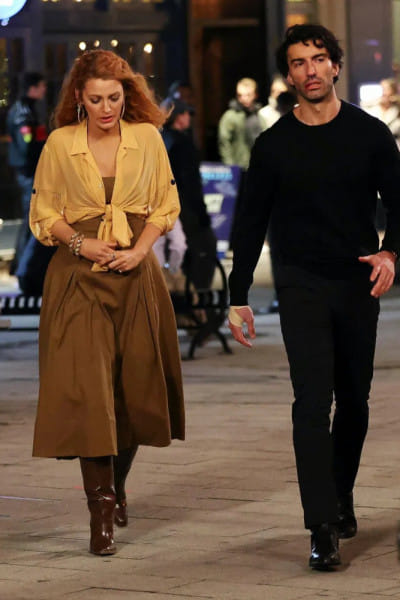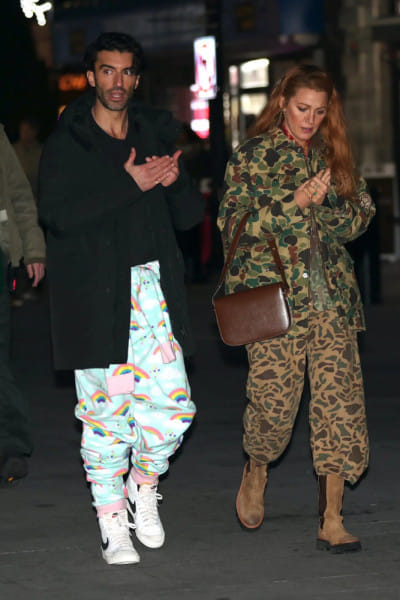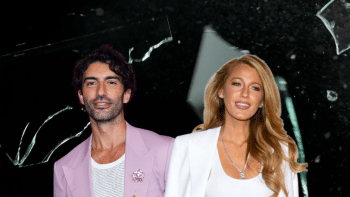Justin Baldoni sues New York Times for $250m over Blake Lively story

Justin Baldoni is pushing back against allegations of sexual harassment levelled by his co-star Blake Lively by filing a defamation lawsuit against The New York Times. On Tuesday, Baldoni accused the publication of releasing an article that he claims was "filled with inaccuracies, distortions, and selective omissions" while leaning on what he described as Lively's "one-sided account."
In December, Lively submitted a formal complaint to the California Civil Rights Department, alleging instances of sexual harassment and retaliation during the production of their film "It Ends With Us".
According to the complaint, Lively claimed that after voicing her concerns about inappropriate behaviour on set, Baldoni and his team retaliated by planting negative stories in the media in an effort to damage her professional image.
Blake Lively's allegations were first reported in The New York Times, which published an article titled, "'We Can Bury Anyone': Inside a Hollywood Smear Machine", on December 21. The 4,000-word article included details from Lively's complaint to the California Civil Rights Department, even though such filings are generally confidential.

In the aftermath of the New York Times report and Lively's accusations, Justin Baldoni was dropped by his talent agency, WME, which also represents Lively and her husband, Ryan Reynolds. Meanwhile, Lively received an outpouring of support from Hollywood, with SAG-AFTRA, the actors' union, issuing a statement backing her. Sony, the studio behind "It Ends With Us", also publicly voiced its support for her.
Justin Baldoni hence countered Blake Lively's allegations, claiming she fabricated the sexual harassment accusations to gain creative control over their film project. According to Baldoni's lawsuit, Lively orchestrated a campaign to "redefine her public image" by making "sensational, attention-grabbing allegations" against him in The New York Times.
"Lively's calculated misuse of sexual harassment claims to exert total authority over the production was both deliberate and deceitful," the lawsuit alleged.
"At the same time, her public standing had been damaged by a series of widely publicised missteps, which she sought to deflect by holding Plaintiffs responsible for the intense scrutiny that comes with being an A-list celebrity. These actions are a blatant attempt to escape accountability. Fame may come with challenges, but Lively's approach in this instance is indefensible," it added.
The lawsuit has alleged that The New York Times compromised its "journalistic integrity" by failing to properly investigate Blake Lively's allegations of sexual harassment and retaliation. According to the suit, the newspaper "almost entirely relied on Lively's unsubstantiated and one-sided account, reproducing her claims nearly word for word while ignoring extensive evidence that refuted her allegations and revealed her actual intentions."
In response, a spokesperson for The New York Times stated that the outlet intends to "vigorously contest the lawsuit."

"The mission of an independent news organisation is to pursue the truth wherever it leads," Danielle Rhoades Ha, a spokesperson for the publication, said in a statement to CNN on Tuesday. "Our report was thoroughly and responsibly prepared, drawing on a review of thousands of original documents, including text messages and emails, which we quoted directly and accurately throughout the article."
"To date, neither Wayfarer Studios, Mr Baldoni, nor any other individuals named in the article have identified a single factual error. We also published their complete response to the allegations as part of the story."
Blake Lively's legal team responded to Justin Baldoni's lawsuit with a statement to CNN, asserting that the claims in the lawsuit do not alter the validity of her allegations.
Initially, Lively filed a complaint with California's Civil Rights Department against Baldoni and his production company, Wayfarer Studios. However, on Tuesday, her attorneys escalated the matter by filing a federal complaint.
"We are prepared to address every allegation raised by Wayfarer in court," Lively's attorneys declared in their statement.
Baldoni's defamation lawsuit, filed by attorney Bryan Freedman in Los Angeles Superior Court, includes a total of 10 plaintiffs. Alongside Baldoni, the plaintiffs include Wayfarer Studios, his producing partner Jamey Heath—who was also accused of sexual harassment by Lively—as well as his publicist Jennifer Abel and crisis manager Melissa Nathan.
Justin Baldoni starred alongside Blake Lively and directed the film "It Ends With Us", an adaptation of the bestselling novel that explores themes of domestic violence within a relationship. Produced by Baldoni's Wayfarer Studios, the film became a box office hit following its release.
Lively's complaint included screenshots of text messages and other correspondence, which her legal team argued were evidence of a coordinated effort by Baldoni's public relations representatives to damage her reputation through what they described as a "calculated social manipulation campaign."
In contrast, Baldoni's defamation lawsuit features extensive records of text messages that his attorney, Bryan Freedman, told CNN reveal the messages in Lively's complaint were "altered and misrepresented." The suit further alleges that The New York Times "deliberately" excluded texts that challenge Lively's account and present a contradictory version of events.
According to Justin Baldoni's lawsuit, The New York Times overlooked critical evidence undermining Blake Lively's claims. "Had the Times genuinely reviewed the thousands of private communications it claims to have obtained, its reporters would have found undeniable proof that it was Lively—not the Plaintiffs—who orchestrated a calculated smear campaign," the suit asserts.
One of the more serious allegations in Lively's complaint accused Baldoni and his producing partner, Jamey Heath, of entering her makeup trailer uninvited while she was undressed, including during moments when she was breastfeeding.

Baldoni's lawsuit refutes this claim by including a text message allegedly sent by Lively to Baldoni, which states, "I'm just pumping in my trailer if you wanna work out our lines," suggesting a collaborative and consensual context to their interactions.
(CNN has not independently verified the authenticity of any text messages. The message in which Blake Lively allegedly invites Justin Baldoni into her trailer is timestamped as June 2023.)
Following Lively's initial complaint, tensions between the two parties escalated, with both sides trading accusations. Questions arose regarding the source of the private text messages included in Lively's claims. In a separate lawsuit, Baldoni's former publicist, Stephanie Jones, alleged that the messages were obtained from the phone of her former employee, Jennifer Abel—Baldoni's current publicist—whom Lively had accused of coordinating a smear campaign against her.
Baldoni, along with his producing partner Jamey Heath, publicist Jennifer Abel, crisis manager Melissa Nathan, and Wayfarer Studios, have all denied Lively's allegations. Instead, they have asserted that Lively herself was responsible for leaking negative stories about Baldoni to the press.
"These allegations are entirely fabricated, inflammatory, and deliberately crafted to inflict public harm while perpetuating a false narrative in the media," Justin Baldoni's attorney, Bryan Freedman, said in a statement to CNN following the initial filing of Blake Lively's complaint.
On Tuesday, Freedman further accused Lively, her legal team, and The New York Times of orchestrating what he described as a "malicious smear campaign."
"In doing so," Freedman stated, "they predetermined the narrative of their story, collaborating on a destructive PR strategy aimed at rehabilitating Lively's faltering public image while deflecting the organic criticism that had emerged online. The irony of their actions is glaring."
Freedman continued, "While their approach relies on selective truths, we stand by the complete truth—and we possess all the communications to substantiate it."

 For all latest news, follow The Daily Star's Google News channel.
For all latest news, follow The Daily Star's Google News channel. 













Comments